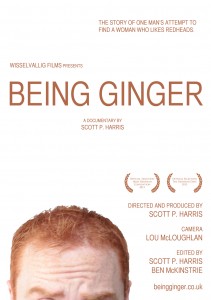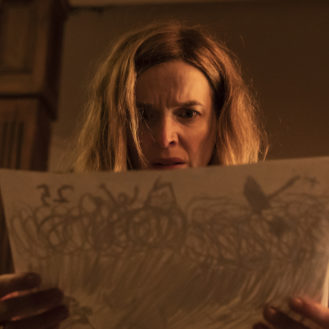For a documentary that presents itself as poorly planned, imagine my elation when Scott P. Harris’ Being Ginger began winning me over with his accidental autobiographical doc.
Harris had me beaming and declaring love towards his personal mission. The filmmaker – who’s a red head himself – sets out across Edinburgh, Scotland to figure out why there’s so much of a disliking towards “gingers”, as well as why it’s so hard for them to get a date.
Being Ginger is much like the film’s protagonist. The film is timid and indecisive only to open up as something more innocent. In early scenes, we see Harris working up the courage to interview women. He has a very hard time doing so, often making conversation with his camera operator, Lou. He finally does so, and it pays off for his doc.
What remains the primary focal point is Harris’ jitters. Just as it was hard for him to approach interviewees, its tough for an audience to get on board with a film who’s leader always seems to be dipping his toes in the water. We keep having this worry as Scott puts the film on hold to take care of other business. It legitimately makes us think that the filmmaker has no clue what to do or say with his movie.
But, as life throws Harris some curveballs, he rolls with the punches and steers his project into a territory that causes him to look at himself instead of his fiery trademark. We see Scott shooting the doc and then editing the portion we just saw as he reflects on the answers he’s collected. It’s during these moments when Being Ginger makes that transitional heave from being a thesis project on social segregation to catharsis for how Scott has dealt with relentless teasing, bullying, and shut-outs. “This was supposed to be something fun,” Harris disappointedly speaks to the camera as he casually starts talking about past experiences at public school, which also leads to the next step of Scott’s overall revelation.
It’s a very strange documentary, but an utterly real look at someone who is facing fears with every minute he records. He uses humour to cope with disdain, which becomes less of a mechanism to shelter his feelings as the doc rolls along.
Much recognition should also be dealt to Lou McLoughlan, who really should be sharing a director’s credit with Harris. She interviews Harris throughout Being Ginger and doesn’t sidestep around anything. She isn’t interested in being pushy with her confrontations but by being gracefully inquisitive, she gets authentic realizations from Scott.
Harris, who could easily be Louis CK’s doppelgänger, eventually learns how to handle the confrontations (including a particularly scathing one) and the twisty route his unpredictable film takes. Anytime the film hits a technical trip, Scott admits and owns the mistake – I respect that.
Earlier this year, another autobiographical doc called Run Run It’s Him showed movie goers how this sort of filmmaking can go horribly wrong and end up being murkily self-indulgent. I’m so glad Scott P. Harris has shown us there’s possibilities to succeed. He may have done most of it by mistake, but he soars with flying colours – most notably red.





Leave a comment